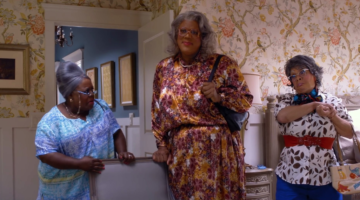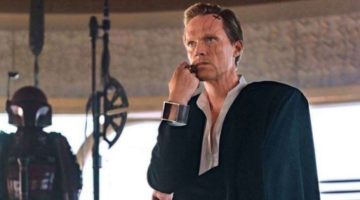Interview: Michael Cohen talks It Was You Charlie
We spoke to LA based Canadian actor Michael Cohen about his first starring role in a feature film. He stars as the complex but troubled Abner in Emmanuel Shirinian’s It Was You Charlie. Cohen is known for his comedic roles but in the role of Abner he displays his diverse range as an actor. He will be teaching a one day workshop on sitcoms in Toronto on August 16th. More info can be found on his site, mdcohenstudio.com.
I just finished speaking with Emmanuel, he said you guys have been friends for a long time. I was wondering if you can tell me a bit about that and how you got on board for the film?
Emmanuel was at the Canadian Film Center and they have to do some short films as part of their program there. There was a film called, The Comic Who Killed. It was this really interesting little film that Emmanuel did and immediately as soon as we met we hit it off. We really kind of spoke the same language and he allowed me to just create this character that wasn’t necessarily what he had in mind but he just kind of went with it.
He had another feature that he was hoping would be his first feature it was a bigger budget film than It Was You Charlie. It just kept getting delayed because of budget and all sorts of things and so he didn’t just want to wait around he wanted to write another film and so he wrote this one and he had me in mind for this.
What was your reaction when you first read the script, to Abner and to some of the scenes in this film?
My first reaction was, wow I can’t wait to sink my teeth into this, it’s a very juicy character. It was also very different than anything I’d seen of Emmanuel’s. It was much less linear in a sense it had a surreal quality to it which his other films didn’t. I wondered how he was going to manage mixing the genres. It has dark comedy in it, it has a mysterious element, definitely a dramatic element – My character’s suicidal, has post- traumatic stress – I just wondered how he was going to achieve all that. I had complete faith that he would I was just like, oh my gosh how are you going to do this. Then of course when I saw the rough cut I was like wow he pulled off mixing the genres very well.
I’ve been doing script consulting since 1994. I have read hundreds and hundreds and hundreds of Canadian scripts and one of the pitfalls that many of them fall into is that they mix genres unsuccessfully. Canadian film in particular is quite – for some reason I don’t know what it is we like to mix genres we very rarely do straight dramatic, straight comedic, straight mystery, straight horror. It’s usually some sort of odd mix and that’s what makes Canadian film so whimsically quirky at times. I’ve seen so many scripts fail because they could not execute that mixing. What just blows me away with what Emmanuel and the team did was to take all these elements and make it work. Nothing stood out as weird.
Abner is such a huge character, so complex emotionally and intellectually. What was the process like for you to become Abner? Was there anything specific that you did to prepare?
I certainly researched post-traumatic stress. I researched suicide. I mean I happen to have been working at a suicide hotline for a couple of years anyway. I also met with people who were survivors of suicide. I took a sculpting course.
I was actually wondering about that did you make any of the sculptures that were featured?
I can’t take credit for that no. I made an amazing nose in my class that was about the extent of it. I wanted to understand not so much how to sculpt but so much as what is the relationship of an individual to their mind and to their body if they are sculpting. So how does Abner feel about his hands, how does he work with his hands, what’s his tactile experience of the world like. How does sculpting inform his view and then when he stops sculpting when he stops being an artist how does that impact him? How does he interact with the world when he doesn’t have that outlet?
The areas that I didn’t have a lot of experience in I really wanted to do a lot of research in so I could feel like I was really creating a character that was true. That’s what was important to me I really wanted to honour Emmanuel’s script and to honour the character that he put on paper and bring him to life as much as I could with integrity and authenticity. I didn’t want him impose my own ideas on it I wanted it to come from a place that was fed through the script and was fed by the given circumstances that Emmanuel gave me.
The film is not necessarily just about unrequited love although that is one of the main elements, in terms of that is that something that you maybe drew upon from your own experiences? I’m making an assumption here but it’s something that happens to everyone at least once.
No, everybody I ever liked loved me back profusely – I’m kidding. Ya absolutely. The majority of it is drawing on any experience I possibly can. It’s impossible not to because I’m using myself. Even researching the sculpting which is foreign to me, I still have had experience touching something that gave me pleasure; I liked the feel of something or creating something. Like creating a character. Sculpting and acting are not that different we’re sculpting image, we’re sculpting perception, we’re sculpting experience. One just uses three dimensional matter the other just uses more of an internal process.
So I took everything I could and related it back to my own experience so for sure any loss, grief, trauma, depression, self-loathing, any of those things that I carry with me I certainly dug into and did my own research in terms of my own life. You have to do that.
You’re more known for your comedic roles. Playing Abner, had you done anything similar to that before?
No, I don’t think so. It certainly had the most dramatic demands of anything I have ever done other than stuff that I’ve done in classes. Certainly the biggest role. I certainly have never done a larger role than the lead in a feature in which I’m in ever scene. I hope to have that honour and privilege again one day. At the same time it didn’t seem like a huge stretch in terms of what I do. I teach comedy and most of what I get booked on is comedy. One of the reasons why I teach comedy is because in order to really do comedy you have to be really good at drama because you have to be grounded in the authenticity and the emotional reality of the character and then there are technical demands on top of that; timing, physicality.
There are a lot more tones you need for different types of comedy. There are all sorts of different types of comedy. There’s not a ton of different types of drama, I mean you’ve got Shakespeare, you’ve got soap opera, you’ve got film. You’re always kind of rooted in the same area. With comedy you really have to be flexible. It’s like dance. If you take ballet you can pretty much go off and do any kind of dance because it’s such a foundation it prepares you for anything but if you just take hip hop and you try to do ballet you’re kind of screwed.
When I was speaking to Emmanuel earlier we were talking a bit about his acting experiences and he mentioned to me that he tends to get type cast as a terrorist or a thug. Is that something you’ve experienced yourself and if so how do you get past that?
You know ironically it hasn’t been which I’m absolutely delighted about. I thought oh for sure I’m just going to always be doing the same kinds of roles. I’ve just been so lucky I have been cast in many, many diverse kinds of things. Now you know I tend to be the kind of person if it’s really kind of a straight project I’ll be – you know ‘cause I’m physically kind of different – that interesting visual that’s kind of different but you know I’ll be a regular character. Or I’ll be some really weird goofy character. I can’t say that there’s anything I’ve been really pigeon-holed at.
You have a BSc in cell biology. How and when did you realize that you wanted to go into acting?
From the time I was a little kid I knew I wanted to act but I do love studying biology and nature and things like that. I like understanding how things work. I know it seems strange on the surface but for me it feels very much like a natural progression. When I teach acting I look very much at the holistic – the whole body, the whole approach to an actor – unlike musicians our instrument is us. The more I know about how I work the more likely I am to be able to master that instrument.



